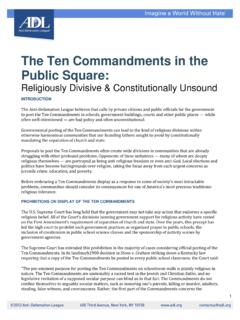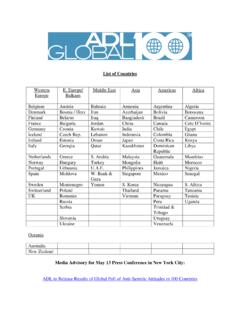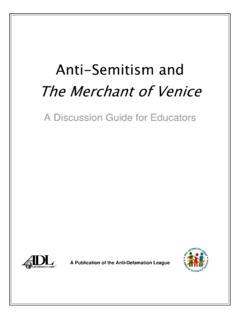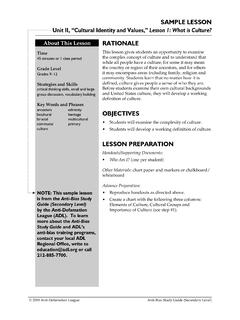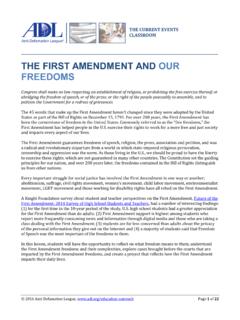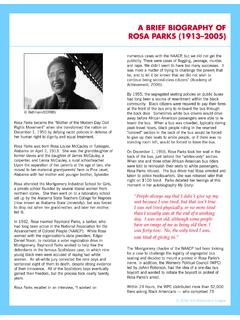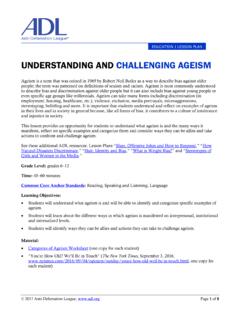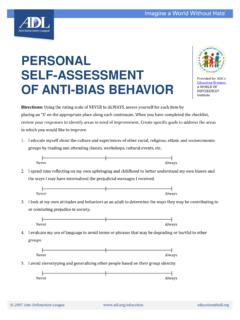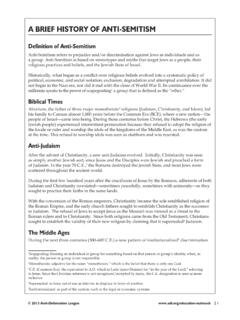Transcription of The Sovereign Citizen Movement - Anti-Defamation League
1 1 The Sovereign Citizen Movement Common Documentary Identifiers & Examples Note: The names and addresses provided as examples in this document are fictional names and addresses used for illustrative purposes, though based on identifiers used in actual Sovereign Citizen documents. No identification with actual persons is intended or should be inferred. The Sovereign Citizen Movement is a right-wing anti-government extremist Movement that dates back to 1970. In its nearly half-century history, adherents of the Movement have employed a large number of pseudo-legal arguments and concepts and evolved a number of linguistic and other tics that make many documents created by Sovereign citizens very identifiable. If noticed and recognized, such identifiers can provide timely warning that the person responsible for the documents may be involved with this extreme Movement .
2 This resource provides examples of many of the most common such documentary identifiers, most of which are unique to members of the Sovereign Citizen Movement . Nevertheless, people should always carefully analyze identifiers only in the context in which they appear and not make assumptions. This document may also be useful in helping people determine if someone is not an adherent of the Sovereign Citizen Movement . In recent years, many people, ranging from vexatious litigators to the mentally ill, have been confused with Sovereign citizens , because their documents or filings may be angry, anti-government, or essentially incomprehensible. However, a document that contains none of the identifiers listed here may well be unrelated to the Sovereign Citizen Movement . Sovereign Citizen ideology, in a nutshell, claims that well over a century ago an insidious conspiracy began to infiltrate and subvert the original, legitimate de jure government, slowly replacing it with an illegitimate, tyrannical de facto government.
3 People who discover this fact can take certain steps to divorce themselves from the illegitimate government becoming Sovereign citizens and once they have done so, they are essentially immune to the laws, rules, regulations, taxes, and courts of the illegitimate government, which has no jurisdiction over them. Many Sovereign Citizen documentary identifiers are thus related to establishing the person as a Sovereign or in creating separation and distance between them and the government they perceive as illegitimate. 2 Sovereign Citizen NAMES Since the 1990s, Sovereign citizens have frequently inserted inappropriate punctuation marks into their names when writing their names or signing their signatures. Not all Sovereign citizens do this, and even some sovereigns who do this do not do so religiously, so the absence of such punctuation marks does not necessarily mean the person is not a Sovereign Citizen , but the presence of such marks is a very strong indication that the person is one.
4 Sovereigns typically employ this punctuation because they think it separates their Christian appellation (their first and middle names) from their government given name (their last name). However, some sovereigns do acknowledge that their last name is actually their name, but use the punctuation to separate their first and middle names from their clan or family name. Typically, a Sovereign will use a comma, a semi-colon, or a colon between their middle and last names. Sometimes a Sovereign will even use two commas or other punctuation marks, as if to create even more separation. Sovereigns also frequently employ a dash between their first and middle names. Some sovereigns will sign with only their first and middle names, leaving their last name off entirely. Examples: Rebekka Fitzpatrick; Thomas Jos -Roberto: Dominguez Robert-Mason of the Clan Simpson Victoria; Harding Treat-Roger: Davidson Edgar Louis,, Jackson Louise Mary [note: no last name] Some Sovereign documents include the same name written in both Sovereign style and normal fashion.
5 For example, a UCC filing document might list Cynthia-Kelly; Sincavage on the creditor line and Cynthia Kelly Sincavage on the debtor line. Such usage typically indicates a common Sovereign belief that the illegitimate government has created an artificial duplicate of the flesh-and-blood person. The normal name indicates the artificial duplicate while the Sovereign -styled name indicates the flesh-and-blood person. Sovereigns use this to claim that references to their normal name are not actually references to them, the flesh-and-blood person, but refer only to an artificial entity that is not them. 3 Sovereign Citizen SIGNATURES Sovereign citizens will also frequently use certain language in conjunction with their names and signatures, usually following their names with that language or, in the case of a signature, sometimes including the language below their names.
6 There are many terms and phrases that can be employed in this fashion, most of which have some connection, however obscure, to actual (though sometimes obsolete) legal terminology. However, sovereigns do not use the language as originally intended but rather use such phrases to mean one or both of two things: 1) that the person indicated has special status as a Sovereign or 2) that by signing or using their name, the Sovereign is not voluntarily entering into a contract with the illegitimate government that would place the Sovereign within the jurisdiction of the illegitimate government. In other words, usage of such terms is almost as a magical totem that will protect the Sovereign from the illegitimate government. Brenda-Sue; Robinson, sui juris Sui juris is a Latin legal phrase that essentially means competent to handle one s own affairs.
7 Sovereigns use this as a miniature declaration of Sovereign status. Anthony Baumgartner, UCC1-308 Daniel-Ezekiel: Ratner, without prejudice UCC1-207 UCC1-308 is a provision of the Uniform Commercial Code (UCC), a body of state law that every state has passed to make financial transactions between citizens and businesses of different states seamless and uniform. UCC1-207 is a reference to the same part of the UCC before it was renumbered some years ago (not all sovereigns are aware of this and continue to use the old reference; others use both old and new together). Regardless of what it actually means, sovereigns think that, if used on a document, it will protect that document from being a contract with the illegitimate government that would make the Sovereign subject to the jurisdiction of the illegitimate government.
8 Connie Sue of the family Britton Suae potestate esse Suae potestate esse is a Latin legal phrase that means having full power over one s dominions; it is similar in nature to sui juris and used in the same way by sovereigns: as a concise declaration or emphasis of Sovereign status. 4 Mario-Michael, Antonelli A Man Upon the Land Sovereigns will also use variations of an English phrase that means much the same thing as suae potestate esse: Man upon the land, Woman upon the land, Man upon the soil, Woman upon the soil, Free Man upon the Land, etc. Again, it is a declaration of Sovereign status. This usage is particularly common among Canadian Sovereign citizens . Gary George Wanamaker, in my natural life Muhammad Anaid-El, Human Being Beverly-Ramona; Huggins, Natural Person Emma Anne, Smith, In Propria Persona Sovereigns will often attach some sort of phraseology to their name to indicate to the reader that it is the flesh-and-blood person being referred to, as opposed to any artificial duplicate with a similar-sounding name that was created by the illegitimate government.
9 In propria persona is a Latin phrase meaning appearing in person; on documents sovereigns use it as an indicator of the flesh-and-blood person. In court, sovereigns who represent themselves in court will use this phrase to indicate that they are doing so, preferring it to the more standard phrase pro se. I am not representing myself, I am myself, is the common refrain. Edward-Thomas of the Clan Czetarnik, without prejudice Without prejudice is a legal term that means without any loss of rights or privileges. Sovereigns use this as a brief declaration of their Sovereign status. Karen Marie Redcloud, TDC Eduardo-Diego, Rivera, Under Duress, Threat and Coercion Sometimes sovereigns will sign a document with the initials TDC after or under their name; this is an acronym standing for threat, duress and coercion, and indicates that they are not voluntarily signing the document (a drivers license, a mortgage document, a traffic ticket, etc.)
10 And thus 1) their signature is not valid and 2) signing the document in such a fashion does not constitute a contract with the illegitimate government that would put the Sovereign under its jurisdiction. Sometimes sovereigns will write out the entire phrase, or variations thereof. 5 Arnold Everett; Krieger Ursula Phoebe Ephraim, autograph common law copyright 2016 Since 2001, a common Sovereign Citizen belief has been that a person can copyright his or her own name and that, once so copyrighted, their name cannot be used without their permission. If someone does use their copyrighted name without their permission, that person is subject to large fines or other punishments. Carson-Craig: O Brien, Secured Party Creditor James Jonathan Smith, Executive Trustee for the Trust known as JAMES JONATHAN SMITH In 1999, a Sovereign Citizen guru named Roger Elvick came up with an extremely convoluted set of Sovereign Citizen pseudo-legal theories known as redemption theory or strawman theory.
